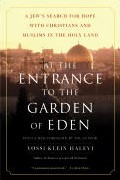bookshelf |
January/February 2003 |
||
Religious dialogue in a divided worldby Christopher L. WaltonMany people — from William G. Sinkford to George W. Bush — have insisted that the world is not embroiled in a "clash of civilizations." The war with al Qaeda, they argue, is not a clash between Islam and the West. But 9/11 publicized another conflict quite clearly: There is a clash of theologies within Islam, and the stakes of that battle are high indeed.
Abou El Fadl's essay, "The Place of Tolerance in Islam," provoked a lively exchange with other scholars last year in the Boston Review. Now Beacon Press has turned that discussion into a brief but important book. "Islam is now living through a major shift, unlike any it has experienced in the past," Abou El Fadl writes. "The Islamic civilization has crumbled, and the traditional institutions that once sustained and propagated Islamic orthodoxy — and marginalized Islamic extremism — have been dismantled." He argues that puritanical Islam is rooted in a misreading of the Qur'an and a rejection of centuries of Islamic cultural development. The Qur'an "presumes a certain amount of moral probity on the part of the reader," and each verse ought to be read "in light of the overall moral thrust of the Qur'anic message" — a point the early Unitarians made about the Bible. Abou El Fadl makes the case for a conscientiously tolerant and modern Islam. Essays by other scholars dispute or expand his argument, making this book a model of the dialogue Muslims need to engage in if we are to avoid a clash of civilizations. Religious dialogue sometimes seems the least likely path to peace, but even in the terrorized Holy Land, some insist on taking it. At the Entrance to the Garden of Eden is the extraordinary spiritual memoir of Yossi Klein Halevi, an Israeli journalist and liberal Orthodox Jew, who recounts his two-year quest to join Israeli Christians and Israeli and Palestinian Muslims in their prayers. Halevi writes, "I wanted to test whether faith could be a means of healing rather than intensifying the conflicts in this land." Meeting Christians and Muslims as fellow worshipers rather than as activists or theological apologists proved much harder than he expected. The result of his experiment is a bold and heart-breaking testament to genuine inter-religious engagement.
In Israel, of course, Islam represents a much more challenging interfaith partner. Halevi finds Muslims with whom to pray through the unlikely guide of a young man named Eliyahu Charanamrit McLean. "The breakdown of traditional religion was embedded in his name: His mother was Jewish, his father Christian, and they raised him in an obscure subsect of Sikhism in Hawaii that preached the universal truth of all faiths." Eliyahu embraced Judaism as a teenager, moved to Israel in 1990, and — in a strange twist — converted to Islam in Cairo after meeting a Sufi sheikh. "He prayed with the most extreme ultra-Orthodox Jews in Jerusalem and met with Muslim fundamentalists in Gaza, neutralizing suspicion by honoring their intensity," Halevi writes. The Sufis, it turns out, are the only Muslims who welcome Halevi's interest. Eliyahu introduces him to Sheykh Ibrahim, a mystic whose visions of Moses had told him to make peace between Jews and Muslims. The story of Ibrahim and Halevi's friendship is the warm heart of this book. But his account of a trip to pray with the Sufi Sheykh Abdul-Rahim in occupied Gaza, where he had been injured as a soldier during the first Intifada, stands out especially. "Gaza presented me, a child of the Holocaust, with an unbearable paradox. I believed that history imposed on Jews two inviolate demands: Never do to others what was done to you, and never underestimate the intentions of your enemy." Wary and sick with fear, he confronts this paradox and goes unarmed into the angry camp of his enemy, hoping to join the ecstatic zikr of the Sufis. There may be no happy endings in the Holy Land, but this clear-eyed, bracing, and often lovely book offers something even more powerful: the honest truth. Christopher L. Walton is senior editor of UU World.
| |||
Copyright © 2002-2003 Unitarian Universalist Association | Privacy Policy | Contact Us | Search Our Site | Site Map
Last updated November 21, 2002. Visited times since January 1, 2003.

